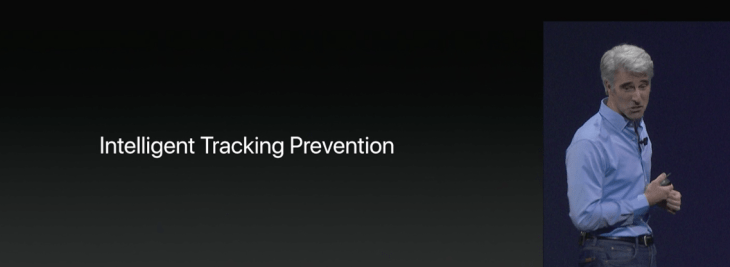No one likes being stalked around the internet by ads for something they once looked at or have previously bought. And Apple has noticed this — so it’s adding an ad tracker blocker for its Safari web browser as part of a series of updates of its desktop OS.
Apple’s SVP of software engineering, Craig Federighi, unveiled the incoming Safari feature — which it’s calling “intelligent tracking prevention” — onstage at its developer conference, WWDC, drawing applause and a handful of appreciative “woos” from the crowd.
The feature will use machine learning technology to power tracker blocking in a bid to outwit the digital stalkers, according to Federighi.
“Safari uses machine learning to identify trackers, segregate the cross-site scripting data, put it away so now your privacy — your browsing history — is your own,” he explained.
“It’s not about blocking ads, the web behaves as it always did, but your privacy is protected,” he added.
There are plenty of questions here — such as how effective the tech will prove versus ad industry ingenuity; whether it will be enabled by default; and how much configuration consumers will be offered. Not to mention whether Apple will be extending the blocker to the mobile version of Safari. But it’s a positive step for privacy.
The explosive proliferation of online trackers in recent years — which not only intrude on web users’ privacy but can add serious lag to page load times too — has led to the rise of browser extensions for tracker blocking.
One of these standalones, Ghostery, was recently acquired by a pro-privacy browser called Cliqz, for example.
Apple has clearly spotted what it feels is growing appetite for web users to have more control over their browsing privacy.
Update: A little more detail on how the tracker blocker will function can be found on Apple’s Webkit blog, where it notes that it’s building on long-standing Webkit features aimed at reducing tracking (such as default blocking third-party cookies) with the new machine learning-powered tracker blocker, and that in its testing process it found popular websites with more than 70 cross-site tracking/third-party cookie trackers — “all silently collecting data on users.”
“Intelligent Tracking Prevention [ITP] is a new WebKit feature that reduces cross-site tracking by further limiting cookies and other website data,” writes Apple’s John Wilander in the blog. “Intelligent Tracking Prevention collects statistics on resource loads as well as user interactions such as taps, clicks, and text entries. The statistics are put into buckets per top privately-controlled domain or TLD+1.”
Apple then applies a machine learning model to classify which top privately controlled domains have the ability to track the user cross-site, based on the collected statistics. It notes that all data collection and classification happens on-device.
The ITP system analyzes the frequency of a user’s interaction with the websites they visit, automatically purging a site’s cookies entirely after 30 days if the person does not visit the site and ensuring its cookies cannot add new data so long as they don’t use the site.
However, if they do visit again, the tracker blocker temporarily adjusts how it responds — by, for example, allowing cookies in a third-party context for a one-day window before shutting that off if the person does not visit the site after 24 hours. In this scenario the cookies are partitioned, which means users can stay logged in to sites they only visit occasionally but those sites’ cookies are restricted for cross-site tracking purposes.
“This means users only have long-term persistent cookies and website data from the sites they actually interact with and tracking data is removed proactively as they browse the web,” adds Wilander.
There’s arguably a pretty big distinction between Apple dynamically shuttering the ability of websites that users of its browser aren’t actively using to deploy cross-site trackers which silently harvest those same consumers’ browsing habits in the background — a practice web users have long voiced loud discomfort about (i.e. when people complain about random ads stalking them around the internet), versus advertising company Google’s recent intent to add “quality filters” to its Chrome browser and actively block ads that do not meet its own quality bar, thereby controlling the marketing content Chrome users are able to see.
Keep up with everything going on at WWDC by watching it here or following our live blog.
